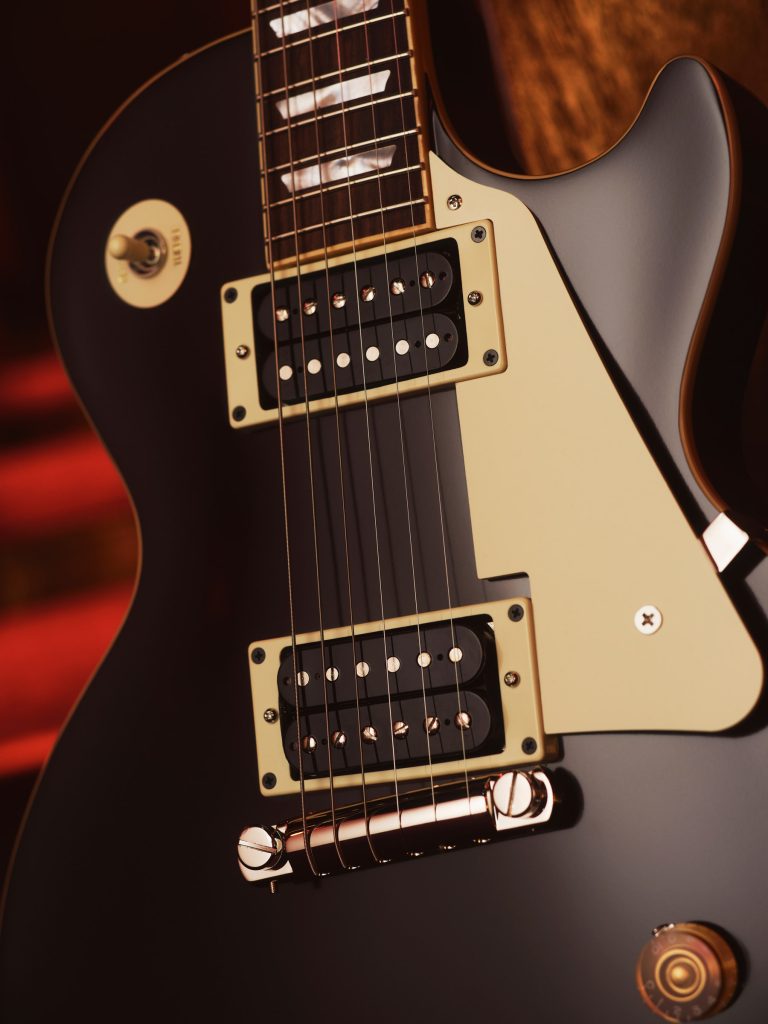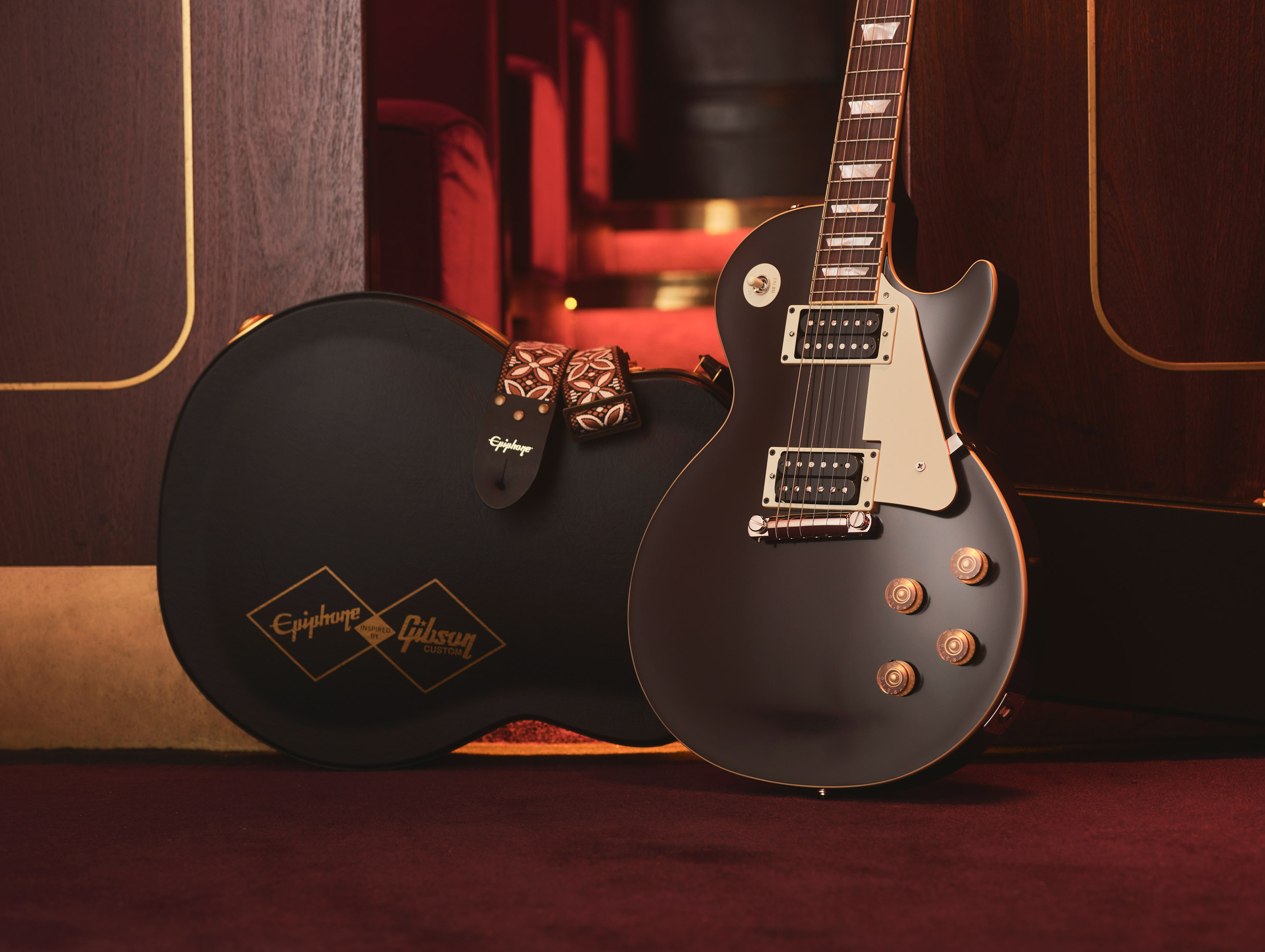A tribute to one of the most iconic electric guitars in history, made famous by Jeff Beck
As part of the Inspired By Gibson Custom collection, Epiphone has unveiled an electrifying new tribute: the Jeff Beck Oxblood 1954 Les Paul™, a meticulously crafted homage to one of rock music’s most iconic instruments. This legendary guitar, known affectionately as the “Oxblood,” originally gained fame in the hands of guitar virtuoso Jeff Beck and featured prominently on his groundbreaking 1975 album, Blow by Blow—more on that in a bit. Beck’s original Oxblood guitar recently fetched an astonishing $1.3 million at auction, highlighting its enduring significance among musicians and collectors alike.
Renowned for both his versatility and his unique and hugely influential playing style, Jeff Beck was an eight-time GRAMMY® Award-winning guitarist whose innovative techniques transformed the musical landscape. Beck, who made history with bands like the Yardbirds and the Jeff Beck Group, was inducted twice into the Rock and Roll Hall of Fame and was honored with the prestigious Ivor Novello Award for Outstanding Contribution to British Music. His distinct sonic signatures—ranging from rock and blues to jazz fusion—set a benchmark for generations of guitarists.

Image: The wraptail bridge helps the guitar deliver unforgettable, dynamically responsive tones
What is special about the Jeff Beck Oxblood 1954 Les Paul?
The Epiphone Jeff Beck Oxblood 1954 Les Paul captures the essence of Beck’s famous guitar with precision and authenticity. Crafted in collaboration with Gibson Custom, it features a mahogany body with a maple cap, a one-piece mahogany neck designed for enhanced stability and sustain, and the specially shaped Jeff Beck Custom Large C neck profile for an authentic early 1950s ride. The rosewood fretboard is adorned with 22 medium jumbo frets and aged mother-of-pearl trapezoid inlays, offering smooth playability and timeless aesthetics.
At the heart of this guitar are two USA-made Gibson Custombucker humbucker™ pickups, known for delivering rich, nuanced tone faithful to the vintage spirit of vintage humbucking pickups. Its electronics, featuring CTS® potentiometers, Mallory™ capacitors, and 50s-style wiring, ensure a classic, responsive sound with a wide array of onboard tones. Finishing touches include the iconic Gibson “open book” headstock with aged mother-of-pearl Epiphone logo, Schaller M6 90 tuning machines, a Graph Tech® nut, gold Speed knobs, a Les Paul pickguard precisely gapped above the bridge pickup to resemble the original, and a Gibson Historic Wraparound bridge.
Presented in a stylish Epiphone hardshell case complete with custom graphics and a vintage-style replica strap, guitar enthusiasts and Jeff Beck fans now have an unprecedented opportunity to own an accessible yet extraordinary instrument that’s a fitting tribute to the legendary Oxblood Les Paul and the iconic artist who made it unforgettable.
How did the original “Oxblood” make its way into Beck’s stable of favorite guitars?
Writing for Gibson.com, author and guitar expert Dave Hunter noted, “While recording in Memphis, Tennessee, in the early 70s, Beck paid a visit to the popular Strings & Things guitar store to see what was hanging on the walls, and was captivated by a ’54 Les Paul that a customer had dropped in for some very specific modifications. One request was that its original Goldtop be refinished to a deep chocolate-brown, a color that turned out to exhibit some oxblood tints in certain light. The original ‘wraptail’ bridge remained just about the only evidence of the guitar’s origins.
“Legend has it that the customer didn’t like the results of all these modifications, but Jeff Beck did. He bought the adulterated Goldtop, played it extensively on tour and in the studio, and even gave it pride of place on the cover shot of his milestone 1975 album, Blow by Blow, securing its position as a legendary Les Paul. Plenty of Beck’s playing in the 1970s does exhibit the incendiary tone that was common to Les Pauldom that decade, but much of it is also snappy, round and lithe, more akin to the semi-clean blues-rock tones prominent in the previous decade.”
Check out the finer points of the Jeff Beck Oxblood 1954 Les Paul today, explore the recent Jeff Beck “Yardburst” 1959 Les Paul Standard, and read our love-letter to the Gibson Les Paul to find out why original Bursts continue to capture the imagination of generations of guitarists.

